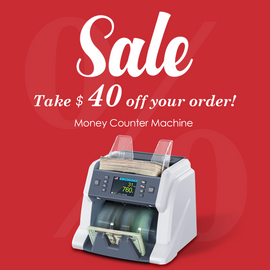This article is brought to you by Ribao Technology, a brand with over 20 years of experience in the cash handling equipment industry. As experts in the field, we aim to provide you with comprehensive insights into the accuracy and reliability of money counters.
Money counters, also known as bill counters or note counters, are highly accurate machines designed to handle large volumes of cash efficiently and reduce the risk of errors compared to manual counting. Here's a comprehensive look at their accuracy, certifications, and important factors to consider.
Certification and Accuracy Rates
Many high-quality money counters are certified by prominent financial institutions and regulatory bodies such as the European Central Bank (ECB). These certifications indicate that the machines have passed rigorous testing to ensure they can accurately count and detect various denominations and counterfeit notes. Thanks to these stringent tests, money counters typically achieve accuracy rates exceeding 99.9%. This means there is a minimal chance of miscounting, with errors being extremely rare. Such high accuracy is crucial for businesses handling large volumes of cash, as it minimizes errors and ensures reliable financial transactions.
Technological Features for Enhanced Accuracy
Money counters utilize advanced technologies to achieve high levels of accuracy. Here are some of the key features:
- Dual CIS (Contact Image Sensor) Technology: Dual CIS sensors provide high-resolution images of each bill, enabling the machine to recognize denominations based on detailed characteristics like size, color, and embedded security features. This technology ensures precise sorting and counting, even with mixed denominations.
- Ultraviolet (UV) and Magnetic Ink Detection: UV sensors detect UV markings, and magnetic sensors identify magnetic ink used in authentic currency, helping to detect and reject counterfeit bills.
- Infrared (IR) Detection: IR sensors scan bills for unique light absorption properties, adding another layer of counterfeit detection.
- Magnetic (MG) Detection: Magnetic sensors detect the presence of magnetic ink and threads in legitimate currency, adding another robust layer of counterfeit prevention.
- Double-Feed Detection: This feature ensures only one bill passes through the machine at a time, preventing double counting and maintaining accuracy.
Limitations and Considerations
While money counters are highly accurate, certain factors can affect their performance:
- Damaged Bills: Torn, excessively worn, or otherwise damaged bills might be misidentified or rejected. Regular maintenance and calibration can help mitigate this issue.
- Sophisticated Counterfeits: While most counterfeit bills are detected, very high-quality fakes might occasionally slip through. Combining machine detection with manual inspection enhances security.
- User Error: Improper loading of bills, incorrect machine settings, or outdated software can lead to inaccuracies. Proper training and regular updates are essential for optimal performance.
Overall Benefits and Best Practices
Money counters are invaluable for businesses and organizations dealing with large amounts of cash. Their high accuracy rates significantly reduce the risk of human error and fraud compared to manual counting. To maximize their effectiveness:
- Use certified machines (e.g., ECB-certified) to ensure high standards of accuracy and security.
- Combine machine use with manual inspection for a comprehensive approach to counterfeit detection.
- Regularly maintain and update the machine software to keep it performing at its best.
Final Thoughts
Money counters, equipped with advanced technologies and industry certifications, provide high accuracy and reliability in cash handling. By understanding their capabilities and limitations, businesses can optimize their use and ensure secure, error-free financial operations.
Read more:
FAQs
Are money counters 100% accurate?
While money counters are highly accurate, typically exceeding 99.9%, no machine is 100% infallible. Regular maintenance and proper use are essential for optimal performance.
Can money counters detect counterfeit bills?
Yes, modern money counters use UV, magnetic, and infrared sensors to detect counterfeit bills. However, the most sophisticated fakes might require additional manual inspection.
Do money counters require regular maintenance?
Yes, regular maintenance, including cleaning and software updates, is necessary to ensure the accuracy and longevity of money counters.







